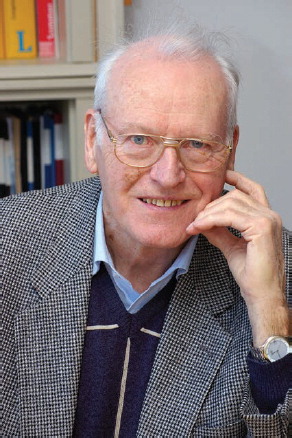Ernst-Wilhelm Otten, Professor Emeritus of Experimental Physics at the Johannes Gutenberg University in Mainz, was born on 30 August 1934 in Cologne. After studying in Bonn and Heidelberg, he received his doctorate in 1962 and his habilitation in 1966, both in Heidelberg. From 1972, until his retirement in 2002, he headed the Division of Experimental Atomic and Nuclear Physics (EXAKT) at the Institute of Physics at the University of Mainz. He spent numerous research stays abroad, among others at CERN and at the Ecole Normale Supérieure (ENS) in Paris. After his retirement, he continued his research activities in some of his earlier fields, especially focusing on the neutrino mass experiment KATRIN. The hallmark of his work was the extraordinary breadth across almost all disciplines of physics, which earned him exceptional recognition and a large number of distinctions and prizes.
In Heidelberg, he developed the method of optical pumping for spectroscopy of tiny amounts of radioactive isotopes to determine their nuclear moments. He also recognized early the opportunities offered by ISOLDE@CERN, which had just been set up, and became a pioneer of optical spectroscopy at accelerators. The discovery of form coexistence in neutron-deficient mercury isotopes is undoubtedly one of the most outstanding results. In Mainz, his group developed the high-resolution method of collinear laser spectroscopy and, in collaboration with the Institute for Nuclear Chemistry, initiated laser-based trace analysis for the detection of radionuclides. In 1988 he was one of the founding fathers of NuPECC.
The former 300 MeV linear electron accelerator and later the continuous-wave accelerator MAMI of the Mainz Institute for Nuclear Physics enabled him to do spectacular experiments: the test of parity non-conservation by neutral currents in polarized-electron-nucleon scattering and the determination of the neutron electric form factor by use of high-density gas targets of polarized 3He. He developed this technique in cooperation with ENS and colleagues from Mainz. With the hyperpolarized 3He gas, it also became possible to perform lung diagnostics by magnetic resonance imaging in collaboration with the German Cancer Research Centre in Heidelberg and the Department of Radiology at the University of Mainz.
In the 1980s, when a group reported that they had found the neutrino mass at an unexpectedly high value, Ernst Otten developed a novel high-resolution spectrometer to determine the neutrino mass very precisely from the tritium beta spectrum. Together with his team, he succeeded in improving the sensitivity to the neutrino mass by an order of magnitude and to refute the postulated neutrino mass value. After the discovery of neutrino oscillation in 1998 proving the existence of neutrino masses, Ernst Otten proposed an even more sensitive tritium beta-decay experiment in order to search for a finite neutrino mass. The construction of this technically extremely demanding KATRIN experiment at the Karlsruhe Institute of Technology started in 2001. Ernst Otten was very actively involved in this challenging endeavor until his death on 8 July. He still was able to witness the first successful tritium data recordings in 2018–19.
Ernst Otten left deep traces in science and in the physics community. He was a great scientist, teacher, mentor, and friend.

